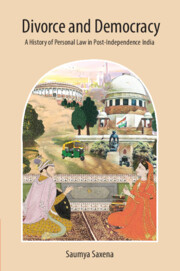Book contents
- Frontmatter
- Dedication
- Contents
- List of Figures
- Acknowledgements
- List of Abbreviations
- Introduction
- 1 Personal Law and the Making of Modern Religion, 1946–56
- 2 Committees, Codes, and Customs: Renegotiating Personal Law, 1957–69
- 3 Social Movements, National Emergency, and the Custody of the Constitution, 1967–79
- 4 Muslim Law, Hindu Nationalism, and Indian Secularisms, 1980–92
- 5 The Court in Context, 1992–2000s
- 6 From the Courtroom to the Courtyard: The Public Life of Personal Law, 2000–Present
- Conclusion
- Glossary
- Bibliography
- Index
3 - Social Movements, National Emergency, and the Custody of the Constitution, 1967–79
Published online by Cambridge University Press: 20 May 2022
- Frontmatter
- Dedication
- Contents
- List of Figures
- Acknowledgements
- List of Abbreviations
- Introduction
- 1 Personal Law and the Making of Modern Religion, 1946–56
- 2 Committees, Codes, and Customs: Renegotiating Personal Law, 1957–69
- 3 Social Movements, National Emergency, and the Custody of the Constitution, 1967–79
- 4 Muslim Law, Hindu Nationalism, and Indian Secularisms, 1980–92
- 5 The Court in Context, 1992–2000s
- 6 From the Courtroom to the Courtyard: The Public Life of Personal Law, 2000–Present
- Conclusion
- Glossary
- Bibliography
- Index
Summary
Marriage is essentially a social affair and therefore succeeds in indoctrinating coming generations in the ideology implicit in it.
—Towards Equality Report, 1974In the 1970s, India witnessed the rise of diverse social movements, many of which focussed on women's rights, and some specifically on women's rights in relation to marriage. Autonomous women's movements were gaining momentum and the decade was also characterized by several influential reports and further amendments to address gender discrimination. The decade also saw tremendous political turmoil during the years of the Emergency which, among other things, brought with it the addition of the word ‘secularism’ to the preamble of the Indian constitution. The national Emergency of 1975 was also followed by a certain reverence for the constitution, and a veneration for the courts. These simultaneous events and processes had very specific effects on the personal law story. This chapter will explore a series of negotiations between and among activists, state actors, and stakeholders, many of which were directed towards precipitating legal change. Emphasis on legal change in turn advanced the idea that the law could be an end goal rather than a means to an end.
The enhanced focus of the social movements on the law yielded outcomes that included protective legislation and progressive judgments for women as well as populist measures that pleased religious orthodoxy. These negotiations with the law are demonstrated through three cases of conflict. First, the disagreement between Muslim orthodoxy and the women's rights movement over intervention in Muslim personal law which provoked a confrontation also between parliament and the court. Second, the women's movement in the decade focussed significantly on legal reform and the influential Towards Equality Report of 1974 added further impetus to the reformative potential of the law. However, the national Emergency subsequently stalled social movements across the country and also accelerated the confrontation between the legislature and the judiciary. The decade concluded with the introduction of the public interest litigation (PIL) that enhanced the citizen's access to judicial remedies. The rise in the judicial element of the state, therefore, had direct consequences for Muslim personal law, and women's rights activism in the decades that followed. Lastly, the Emergency also entailed a substantial debate on secularism in parliament.
- Type
- Chapter
- Information
- Divorce and DemocracyA History of Personal Law in Post-Independence India, pp. 139 - 185Publisher: Cambridge University PressPrint publication year: 2022



